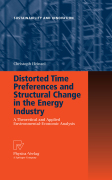
Distorted time preferences and structural change in the energy industry: sustainability and innovation
Heinzel, C.
This study contributes to the economic discounting debate by examining the welfare and policy implications of distorted time preferences for private investments. Specifically, the analysis is applied to the energy industry, where it is of particular importance. In the transition to a low-carbon energy structure, distorted time preferences are shown to induce a distortion, in addition tothe distortion caused by the emission externality. Its extent varies directlywith the time lag in capital accumulation. In order to implement the sociallyoptimal path, environmental policy needs to be complemented by technology policy. The theoretical findings are applied to the upcoming structural change inthe German energy industry in the 2010s. INDICE: Introduction.- Theoretical Analysis: Foundations of the Theoretical Analysis.- A Theoretical Model of Structural Change in the Energy Industrie.- Summary of Results, Discussion of Assumptions, and Policy Implications.- Applied Analysis: Foundations of the Applied Analysis.- Technology Choice Under Environmental and Technology Policies.- Optimal Moments of Transition Under Environmental and Technology Policies.- Conclusions.
- ISBN: 978-3-7908-2182-6
- Editorial: Physica
- Encuadernacion: Cartoné
- Páginas: 200
- Fecha Publicación: 01/04/2009
- Nº Volúmenes: 1
- Idioma: Inglés
